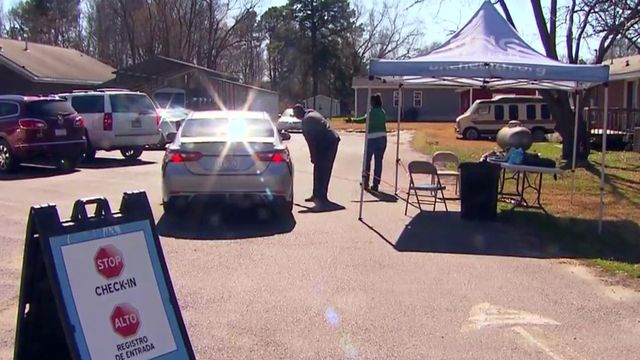Providers must overcome logistical hurdles in addition to mistrust to get vaccine to rural NC residents
Nearly 1,600 people were vaccinated against coronavirus Wednesday at a drive-thru clinic at West Johnston High School. But more than 400 doses were left when the clinic was over, even though it was the first day supermarket workers, police officers and others in frontline positions were eligible for shots.
Posted — UpdatedEleanor Wertman, a UNC Health program manager for community health, said Thursday that she wasn't surprised the Johnston County Health Department had to send more than 20 percent of the doses set aside for the clinic to pharmacies and physicians across the county to use so they wouldn't waste.
"It takes a while for the word to get out," Wertman said. "Especially if you are somebody who is a little bit on the fence, you are not necessarily seeking information.”
Wertman is helping lead UNC Health’s mobile vaccination clinic in Johnston County. So far, the mobile clinic has given 1,000 shots at stops in Benson, Clayton, Kenly and, on Thursday, at Howell's Chapel Church of Christ in Selma.
"Things like mass drive-thru events, those are a great way to get a lot of people vaccinated at once, but if you’re someone who can’t sit in a car for a lot of hours because of your job or your health conditions, that’s not really feasible," she said.
The small clinics help avoid obstacles like lack of internet or transportation that would prevent someone from scheduling an appointment online or traveling to a drive-thru clinic farther from home, Wertman said.
“I have done a fair amount of work in rural counties before, and what I have found is that so much information is spread face to face and on paper still, and it is hard to spread information face to face and on paper during a pandemic when you are not supposed to be out and about," she said. "There is a lot of conflicting information, and some people are just in a place where they are not mentally ready to consider taking this vaccine."
Count Johnston County resident Whitney Burnette among that group.
"They just came out with it a little fast," Burnette said. "I am not opposed to getting it. I just want to see if there’s going to be any long-term effects."
Dan Massey said he got vaccinated but noted that his neighbor remains skeptical.
"She is, I wouldn’t say terrified, but very nervous about the vaccine because it all happened so quick," Massey said.
By meeting people where they are, Wertman said she hopes to build trust in the vaccine.
"It really does make a difference," she said. "As more people get vaccinated and you know someone who took the vaccine, it is changing attitudes."
UNC Health targeted Johnston County for the mobile clinics because of the racial disparity there in terms of who's being vaccinated, Wertman said. So, she is partnering with churches in Black and Latino communities.
"A lot of the people we are trying to reach are not following UNC Health on Facebook, but they are going to all their online church services and trusting leaders in their community for health information," she said. "Part of the impact we are trying to have is not only getting shots into arms, which is, of course, important, but also really establishing vaccine ambassadors within their community who can go out and speak to others and say, 'I did this. It actually wasn’t that scary.'"
Johnson County officials said they are working to contact area employers directly to better gauge vaccine interest in the community.
Wertman said it might help to have clinics on nights and weekends because many frontline employees work during the day and can't make it out to clinics like the one Wednesday.
Related Topics
• Credits
Copyright 2024 by Capitol Broadcasting Company. All rights reserved. This material may not be published, broadcast, rewritten or redistributed.






